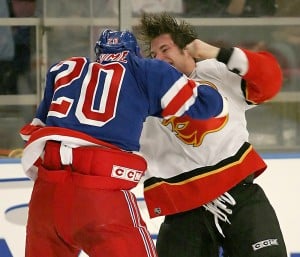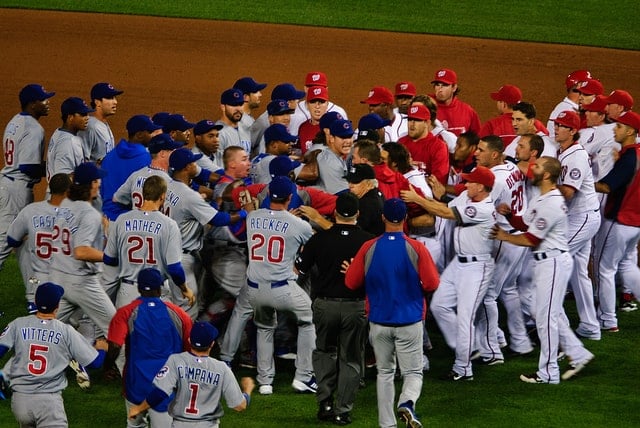Don’t you hate the Yankees!?! They’ve paid for won more World Series than any other team in the major leagues. Or what about the Red Sox? Those big-spending, beard-growing, World Series-winning jerks! Do you hate the Miami Heat for their back-to-back championships?? And, they might be on their way to another. UGH!!! How about those dirty-playing L.A. Kings? Forget about teams, everyone hates the Clippers owner, Donald Sterling who is about the most hated person in America. What about LeBron James? If you’re from Ohio, I can guess your sentiments: you hate him.
With the NBA and NHL Finals here and the MLB season in full swing, it’s a great time of year talk about the people and teams we hate. It’s one of the easiest conversations to have about sports: who do you hate? Ask sports fans about the teams and players they love, and they’ll give you a short list of favorites. Ask them about the teams and players they hate, get comfortable: this might take a while. “Sports hate.” We might as well call it an American pastime.
***
There are few recreational activities that inspire as great a range of emotions as sports. It’s an activity that demands emotional investment. Athletes are exerting themselves physically in a competition where effort can overcome differences in talent. The rest of us – the sports fans – don’t undergo the physical exertion of athletes, but we often match their emotional investment.
Hate is a powerful emotion. We can find emotion in cheering for our teams, but the emotion rises when we face a team that elicits strong negative emotions. This is what gives birth to rivalries: one of the biggest draws in sports. Take, for example, Red Sox-Yankees, North Carolina-Duke, Michigan-Ohio State, to name a few. Rivalries begin from the fact that two teams play each other year after year. In the us-versus-them world of sports, one team goes home with a win and the other ends up a loser. Over time, this builds into animosity between teams and their fans. This is what sports rivalry is all about, and it naturally cultivates sports hate.
So it’s not surprising that we enjoy sports hate. Bill Simmons, the ESPN columnist, calls sports hate “an underrated part of fandom,” adding that our reasons for feeling sports hate are unique to us and don’t even need to be rational. We might hate a player because they left our team in free agency or demanded a trade. We might hate the team that wins the most or spends the most money or knocked our team out of the playoffs. Sound familiar? Heck, we might hate a player because he or she throws left-handed or because of his or her shoe color. Simmons point is: the reasons don’t matter. As long as there is SOME reason, we feel validated in our sports hate.
It’s almost like sports hate is something we need: a natural by-product of sports fandom. But do we need it? Simmons seems to think so:
“As fans, fundamentally, we need to root against certain players. Need to be bugged by them. Need to have our least favorite guys fail in the clutch just so we can say, ‘See, I told you, he sucks when it matters!’ Need to taunt our friends who root for their teams. Need to see the pouty look on their faces when things go wrong. Need to say things like, ‘He’ll never get it, he’s a loser’ and ‘He’s selfish and that’s that.’ Need to be definitive about people we don’t like. And why. And for as long as we can possible keep it going.”

A good ole-fashioned hockey fight
Patrick Tuohy / Shutterstock.com
We can’t seem to escape sports hate. But do we really need it?
***
Is it a good practice to be so casual about sports hate? It’s obviously not the same thing as real hate, right? When we talk about hating a player, it’s not as though we really wish bad things to happen to them. We just want them to lose and fail in their sports…not in life or anything more serious. Right?
Simmons writes about Kareem Abdul-Jabbar, the basketball star that he hates as a player. When Kareem was diagnosed with leukemia, Simmons talks about how terrible he felt for Kareem and how he hoped for Kareem’s recovery. There’s a difference between real hate and sports hate. We can separate the two. Or so we think…
We should be careful with hate. It’s a dangerous thing. Even a small seed can grow into a towering tree. What type of seed are we planting? How does sports hate impact us as fans? As people?
As out of place as it sounds, I first started reflecting about sports hate during a silent retreat (typical Jesuit, right?). I was praying over the Gospel passage where Jesus urges his disciples to love their enemies and pray for those who persecute them (Mt. 5:44). What did this passage mean for me? Who are my enemies? Who was I supposed to love and pray for?
It was hard for me to come up with an answer. I couldn’t think of anyone in my life that I would actually call an enemy. There’s no one that I live with, work with or know personally that I feel persecuted by and really, actually hate.
A Theology teacher from my college once commented that it’s hard to hate someone that you know. That rings true in my life. Conflict mediation always involves getting opponents to sit down at the same table, which makes sense. When we sit across from someone and engage him or her personally, it gets easier to recognize our commonality and our shared humanity. This fractures our reasons for hate and draws us closer together.
It’s no wonder then, that in times of conflict, we tend to distance ourselves from the other. Instead of thinking about our shared humanity, we begin to demonize the other and think of them as less than human. We do this surprisingly often in times of war and political conflict: whether it’s the Nazis, or Communists, or Al Queda.
We hear Church people talking about hating the sin and not the sinner, but most of us are guilty of doing just that. We don’t just hate the things done by Hitler or Stalin or Bin Laden – we hate them. And this is real hate.
Are these the people that the Gospel is calling me to love and pray for?
***
You might be thinking, “Woah, woah, woah – Brian, how did we get from sports hate to the Holocaust? Isn’t there a difference between sports hate and real hate?”
I think we can turn to an unlikely source for help in this, St. Thomas Aquinas. Yes, the Angelic Doctor can shed a little light on sports hate. Shocking, I know, but stay with me. Among many things, Aquinas is well known for his doctrine of analogy, which is applicable to our language here.
When we use words analogously, we are using words with different, but related meanings. We use words in this way all the time. For example, just think about our overuse of the word “love.” We might say a woman loves her husband, her job, her dog, sleeping in, ice cream, and romantic comedies. Do we really mean the same exact thing in all these cases? Certainly the meaning is related, but we have to admit there is a difference in both kind and degree.
This analogous use of language helps us come to grips with sports hate. It is pretty obvious that saying “I hate Kobe Bryant” is different than saying “I hate what Hitler did to the Jews.”
But it’s helpful to talk about this. Because here’s the rub: analogous words are related. Love is different when we talk about our mother or pizza, but it’s related. Hate is different when talking about sports or war crimes, but it’s related.
And so we should be careful with hate. Sports hate might feel innocent enough, and most often, it is. But what happens when sports hate goes wrong?
Athletes receive hate mail, or they get screamed and cursed at. Researchers are already looking into the psychological effects on college athletes heckled on social media. That’s not the worst of it: sports hate can even lead to murder. Just look at this tragic story of a fatal stabbing after a Dodgers-Giants game.
These stories of sports hate that grows into something more make me aware of when I catch myself talking about which baseball team or NBA player I hate. What values and attitudes are we cultivating in ourselves? Is it worth it?
In the recent movie “Philomena,” the title-character has a moving exchange about hate and forgiveness. Addressing a woman who kept her son from her, she says, “I forgive you because I don’t want to remain angry.” Then she turns to the journalist with her and she says, “I don’t want to hate people. I don’t want to be like you. Look at you.” “I’m angry,” the journalist replies. Philomena replies: “Must be exhausting.”
Hate is exhausting!

Sports Love, not Sports Hate
Lucky Business / Shutterstock
Rick Reilly, an ESPN columnist who is nearing the end of his sportswriting career, wrote in a recent article about forgiving the athletes that have drawn his own sports hate. “I wonder whether I need to make peace. Peace with athletes who thrilled me, then disgusted me. Pete Rose, Ben Johnson, Mark McGwire, Marion Jones, Tiger Woods, Lance Armstrong. Peace with letting myself be thrilled, and then fooled, time and again. Why carry it as I go?”
There’s no need to carry it, for any of us. It gets us angry, it exhausts us, it prevents us from loving the way we want to. It’s just not worth it.
I mean, why waste so much energy on sports hate when we can focus on the best part of sports? Why don’t we talk about Sports love? That’s the seed I want to grow. I want to cheer on my favorite teams, and favorite players; I want to rejoice with my team after a win, and mourn with them after a loss.
Despite what Bill Simmons writes, we don’t need sports hate. We don’t need to hate at all.


